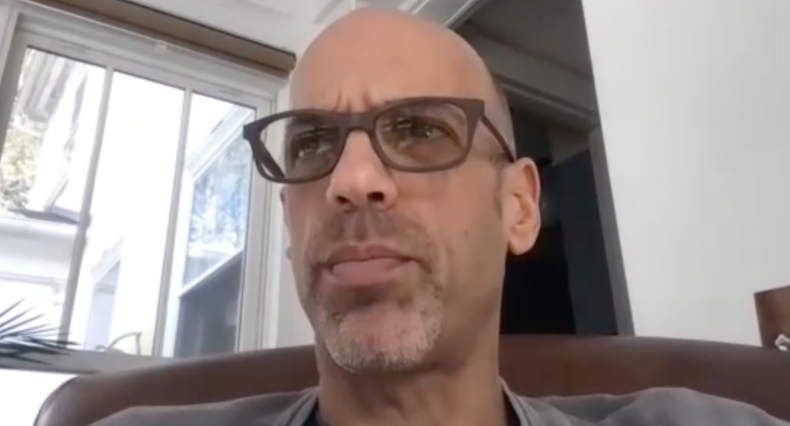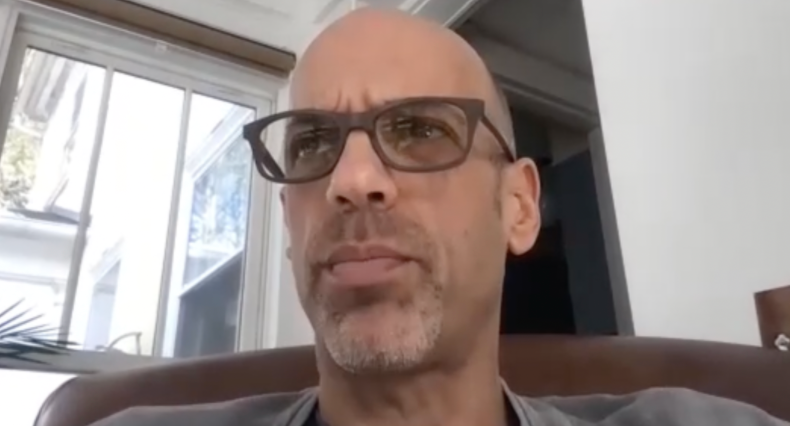
Daniel Markovits, PhD is the Guido Calabresi Professor of Law at Yale Law School and founding director of the Yale Center for the Study of Private Law, a center providing instruction and research in contracts, property, and torts. His most recent book, The Meritocracy Trap, posits that meritocracy is a significant cause of rising inequality in the United States. He has also published several articles in The Atlantic.
Charles Alaimo: What is meritocracy? Why does it no longer reflect equality of opportunity?
Daniel Markovits: Meritocracy is the social and economic system that allocates advantage based on accomplishment rather than based on something else like gender, class, race, or religion. People often conflate meritocracy with equality of opportunity, but they don’t necessarily mean the same thing all the time. There are three inputs to accomplishments: talent, effort, and training. In a world in which training is unequally distributed, particularly a world in which rich parents can invest enormously greater sums in educating their children than anybody else can possibly afford to, even if all children have the same talent and deploy the same effort, those who get the most training will accomplish the most. And that means that in our world, where rich parents do out-educate everybody else because they can afford to, rich kids will accomplish more than middle class kids and working class kids do simply because they get more education.
Here’s a concrete example of that: the difference between the average SAT score of a rich child in the United States whose parents make more than $200,000 a year and the SAT score of a middle class child whose parents are right at the median household income is about 250 points. Whereas the difference between the scores of that middle class child and a child who grows up at or below the poverty level is only about 125 points. And the reason for that is the rich kid goes to schools that spend much much more on educating their children. The rich kid gets tutors, and extracurricular training, and support in preparing for the SAT. And that means when you measure children based on their accomplishments, the children of rich parents will disproportionately be the most accomplished. This is why meritocracy now blocks equality of opportunity, rather than promoting it.
What does America stand to lose from socioeconomic inequality? If everyone is getting wealthier, why does it matter if some have more than others?
That’s not the situation that we’re in: we’re in a circumstance in which we have both rising inequality and slowing growth. There’s an old story that says that inequality is the price of growth, that high earners produce more for society than they take for themselves. Now these elites have to be given an incentive to work, so they will get very high incomes. But according to this story, everybody else will benefit too, because the work they do will be so productive that the rest of us will be better off, even though they get richer than we do. That turns out not to be the world that we’re living in today for at least three reasons.
First, it’s actually not true that you have to give elites enormous incomes to incentivize them to work. The best evidence we have now from economics and other social sciences shows that at the top of the income scale, the effect of higher wages on labor effort is effectively zero. The richest people work as hard as they do for reasons other than wanting more money. And that’s perfectly rational, because once you’re rich enough, the consumption value of more money is zero anyway. The very rich work because they’re competing with other rich people for status, because they care about their work, or because they want fame or some other social good. Not because they need to earn one more dollar to buy things that they want to consume.
Second of all, enormous inequality distorts our economy. One of the familiar ways is this: the rich have much less of a tendency than most people to consume their income. They save it rather than consume it because they don’t need to buy anything. So high inequality reduces aggregate demand. And in a consumer-driven economy, aggregate demand is what drives growth.
The third reason, which is the least familiar to most, but I think is actually the most important, is that high inequality distorts how we run our economy and which technologies we use to make goods and provide services. High inequality creates incentives for people to invent ways of working that favor the rich, even at the cost of collective productivity and economic wellbeing. For example, we have an incredibly financialized economy today, in which finance takes up a bigger and bigger sector share of GDP and finance workers make more and more money. But there’s literally no evidence that this extreme financialization promotes higher productivity or growth for everybody else. Instead, what’s really happening is that these financial technologies respond to a super elite workforce and bend the way in which they operate to match the work that the elite does. So the elite can now capture enormous wages. High frequency trading, securitization, and derivatives are all new technologies of financialization that have very low social product but produce enormous wages for those who deploy them. And so for all three of those reasons, it’s actually just not true that inequality today where we are now promotes growth, it’s more nearly the opposite.
Now, you also asked, “Why is inequality a bad thing?” Well, it’s a bad thing for at least two reasons. First, it distorts democratic politics. When a narrow oligarchy gets wealthy enough, its economic power becomes political power. And the collective decision-making process gets hijacked by the rich, which is one of the things that we’re currently seeing in our society. And second, such inequality coupled with the meritocratic justification for it — the idea that the rich deserve to be so much richer than everybody else — imposes an enormous moral and social insult on everybody in society except the elite. And that insult is demoralizing. It causes people to feel like failures when they’re not failures. It causes them to see structural oppression in terms of their own inadequacy, which is morally mistaken and psychologically damaging, and it causes people to lash out and to look for scapegoats. And we see both those things happening now. The American middle class, for example, is suffering an epidemic of opioid overdose, partly brought on by the psychic and emotional harms associated with being unable to get ahead in a meritocratic world. And at the same time, the middle class is also lashing out against people of color and immigrants. This is the sort of outwardly directed form that the moral insult of inequality takes today.
Has thinking about the culture of stress and overwork at elite schools changed how you teach your own classes at Yale?
On the one hand, it’s not clear how guerrilla warfare against this system can succeed. Right now, anything that one teacher or one parent does has to be consistent with the inner logic of the system in which we are all operating. My students are going to go to law firms where they’re expected to have a certain set of skills and to work a certain number of hours, and part of my job is to train them effectively to be able to thrive in that environment. Even if I think that environment is socially unjust, I can’t do my local duty towards my students without actually preparing them for that environment. So in that sense, I operate according to the rules. The only way we can change is collectively rather than individually.
On the other hand, I think there are some ways in which I teach differently from other similarly situated teachers, and maybe even from the way in which I used to teach. I try to give my students a perspective on the system that they’re a part of, both in the substance of what’s taught and in the attitudes towards the class. It’s not part of my teaching to insist that the students believe that what we’re doing in class is important or require them value it more highly than other features of their lives. I try to convey that they have a thousand concerns, and if they want to put me and my class at the bottom, I won’t hold it against them. In fact, that may be what they should be doing. Of course, they should understand that they’re in a system in which if they do that all the time, there’ll be costs to their careers. But maybe they should bear those costs, because maybe they’ll be better off as people if they do. So maybe that is a way in which my academic views are reflected in my teaching.
If the way to fix inequality is through collective action, what would that action look like?
So I think we actually know what policies we need. They involve a massive investment in middle class and working class education, and a massive redistribution of education so that the elite is less narrow and less elite. On the worksite we need a massive democratization of work, empowerment of mid-skilled workers, change in the way we tax wage income so that we no longer favor super-skilled workers, changing the regulatory environment so that we disfavor extravagantly complicated forms of technology and skill. So we know what those policies look like.
The real question is what do the politics look like? When the people who are pushing for equality score a victory, it must strengthen their hand rather than produce a backlash. We need a politics where, when we win round one for a progressive agenda, people join us, rather than being alienated. What does that mean in practice? It means building coalitions, understanding the importance of the middle class, and emphasizing economic justice. My private politics are irrelevant here, but one of the things Senator Sanders has been successful at is drawing in a coalition of people who previously did not vote together. He has managed to bring in Trump voters while also being attractive to the more traditional American progressive coalition. We have to build a multiracial, multiethnic, working and middle class majority. That’s the challenge.
What can elite universities do? What can students pressure their institutions to achieve?
Right now, elite universities are probably, on balance, engines of equality with respect to the very worst off in society. They produce ideas that help the poorest and most marginalized members of our society, and they work pretty hard in their admissions process to identify talented and energetic people from the most marginalized groups and bring them inside their walls as students. But at the same time, elite universities are engines of inequality with respect to the gap between the rich and the middle class. They drive technologies and forms of work that empower the super elite and stagnate middle class wages, and they don’t do a very good job of admitting large numbers of middle class students. In fact, there’s at least anecdotal evidence that as universities have gotten better about admitting more working class and poor students, those new admits have come from the ranks of the middle class rather than from the rich. So, if you look at student body demographics, the share of really rich kids at elite universities has not gone down very much.
So what can universities do? They can start admitting many more middle class kids, partly maybe by admitting fewer rich kids. But I think if elite universities started cutting down on the number of rich students that they admitted, then a large group of currently relatively progressive professional elite parents would turn against the agenda. So this policy change would be more just, but might not be self sustaining. Whereas if Ivy League universities just started admitting many more students, and took almost all the new students from the bottom two thirds of the income distribution, the elites would still get their slots and would be perfectly content to favor that kind of a plan. And the universities could become engines for middle class mobility. The universities are plenty rich enough to do this; per-student expenditures per year in the Ivy League today are twice what they were in 2000. So if the Ivy League educated twice as many students, it would be spending the same amount per student as it did in 2000, and it seemed perfectly able to deliver an education then. Now, I suspect the group that would be most unhappy would be the professors. And if I were only thinking about my private interest, I would be unhappy about that. It’s a lot easier to teach in extremely elite, extremely small classes. But it’s not written anywhere that the mission of the university is to make my work easy.
Pending collective change, what can we do on a personal level to find worth outside the system? Do you have any specific advice for students at elite schools?
If you’re in the elite, you have to find a way to push back against the overemphasis on incredibly intense, incredibly long hours at work. One thing you can do is cultivate a personal life. For most elite workers, their biggest failures in life will be personal, not professional. They won’t be as good spouses, parents, or children as they really should be. They won’t be as attentive and loyal friends as they should be. And their careers are going to be fine. They may not quite get to the job that they want or the salary that they want, but they’ll get a job and a salary that is good enough and high enough that wanting more is vanity. But in our personal lives, we really can let people down in ways that are wrong and make our lives worse. Always be attentive to your personal lives, even when it comes at a cost to professional life, because the risks are just greater on the personal side.
If you’re ever offered a trade between a little bit more income and external social status and a little bit more freedom and internal satisfaction, always pick the freedom and satisfaction. If you’re choosing between two jobs, and one of them is just really compelling to you, and interesting, and in a place you want to be with people you want to work with doing tasks that you think are valuable, and the other job feels alienating to you but you think it will position you to get something else five years from now, pick the first one. It’s not worth it to pick the other one. Because if you pick the other one, five years from now you’ll again be faced with that choice between a job that’s immediately compelling and a job that will get you something even grander five years from then. And then five years from then it’ll be the same choice. And soon you’ll be 60 and you’ll never have done what you wanted to do. So concretely, pick the thing that appeals to you now. If you’re deciding what classes to take, pick the classes that you actually want to study, rather than the classes that you think will help you get into X or Y graduate school. That seems like a not bad rule of life.
*This interview has been edited for length and clarity.




